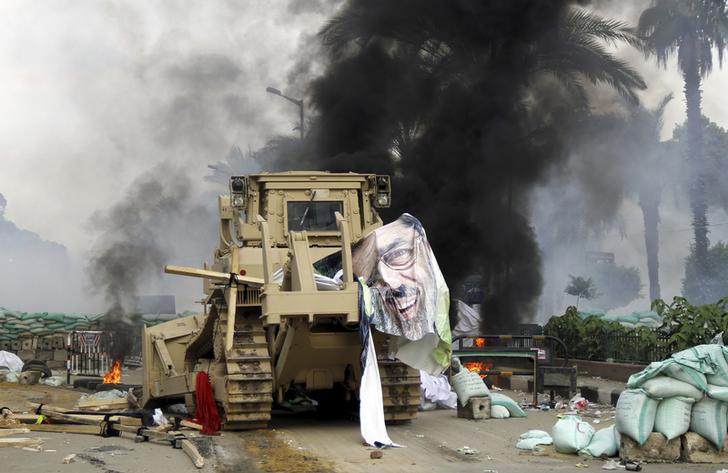Latest NEWS
- Aswat Masriya, the last word
- Roundup of Egypt's press headlines on March 15, 2017
- Roundup of Egypt's press headlines on March 14, 2017
- Former Egyptian President Hosni Mubarak to be released: lawyer
- Roundup of Egypt's press headlines on March 13, 2017
- Egypt's capital set to grow by half a million in 2017
- Egypt's wheat reserves to double with start of harvest -supply min
- Roundup of Egypt's press headlines on March 12, 2017
439 referred to military judiciary over post-Rabaa dispersal violence

A torn poster of deposed Egyptian President Mohamed Mursi is seen as riot police clear the area of his supporters, at Rabaa Adawiya square, where they had been camping, in Cairo August 14, 2013. REUTERS/Mohamed Abd El Ghany
CAIRO, Dec 13 (Aswat Masriya) – The Egyptian prosecution referred on Saturday 439 defendants to the military judiciary over violence which followed the deadly dispersal of two pro-Mohamed Mursi camps in August 2013.
Egypt’s top prosecutor referred 139 defendants, believed to be Muslim Brotherhood supporters, to a military tribunal over the killing of a police officer and two policemen, as well as breaking into a police station in Minya and torching it.
The Damanhour general prosecutor referred 300 more to the military prosecution, accusing them of torching the Beheira Governorate building.
Gamal Abdul Hameed, a Minya lawyer following up with the case, told Aswat Masriya the Minya case was referred to the military prosecution based on a decree passed by President Abdel Fattah al-Sisi in October.
Sisi issued on October 27 a new law which refers crimes committed against the state's public and "vital" facilities to the military judiciary.
The law, criticised by human rights organisations for expanding the jurisdiction of military tribunals on civilians, was passed shortly after the death of at least 33 security personnel in militant attacks in Sinai on October 24.
Abdul Hameed said the law can be applied on cases which have not yet been referred to court, even if the events took place before the law’s issuance.
The Cairo Criminal Court referred to a military tribunal on November 16 five students at al-Azhar University accused of torching the university's control room, based on the same law.
Article 204 of Egypt’s new constitution already allows referring civilians to military trials "in cases which represent a direct assault on armed forces institutions, their camps or anything that falls under their authority, alongside assaults on military or border zones, and military institutions, vehicles, weapons, ammunition, documents, secrets, public funds, or factories."
The article was strongly condemned by civil society organisations and a number of political movements before the constitution passed.
No Military Trials for Civilians, a group campaigning against referring civilians to military tribunals, has rallied protests against this article as well as previous legislations which allow the military trial of civilians.
Authorities have led a crackdown on Muslim Brotherhood members and supporters since the military ouster of Mursi in July 2013. Mursi himself is in jail, facing a string of charges in more than one court case.
A court in Minya has served over 1000 Muslim Brotherhood supporters preliminary death sentences in March and April. The same court later ratified the death sentences of 220 of the said defendants after consulting the Mufti. The sentenced defendants included Mohamed Badie, the Muslim Brotherhood's supreme guide.
The mass death sentences have also been widely condemned by a number of states, international bodies, and civil society organisations.










